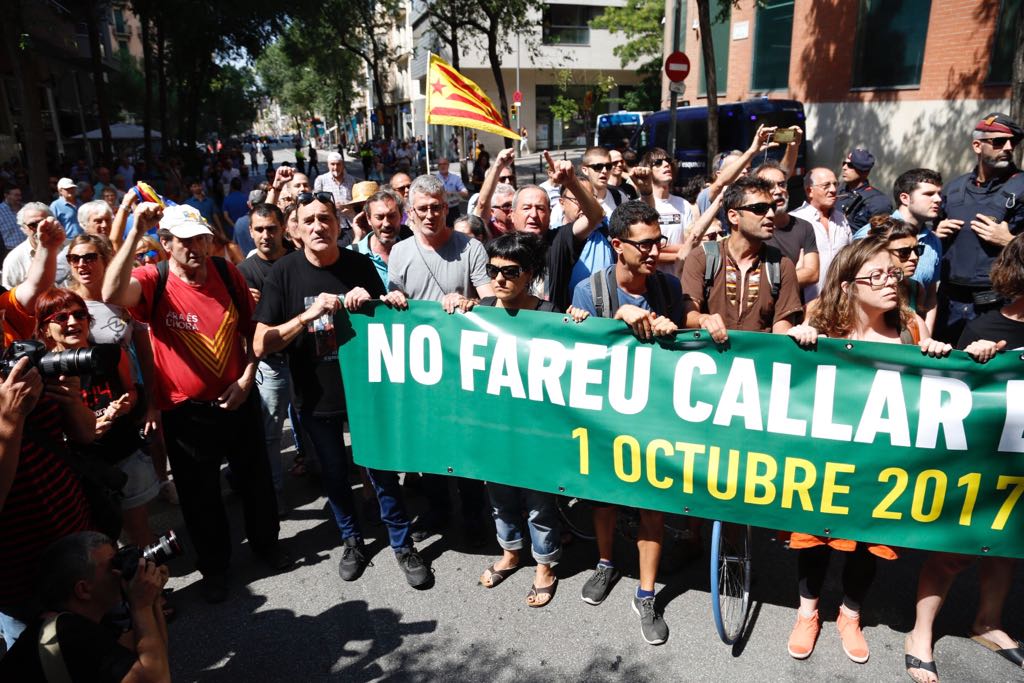The Catalan CUP party and Arran youth organisation should be given the same treatment as that given to the Basque Batasuna party and Jarrai youth organisation in the time of the Basque terrorist group ETA. That's the proposal of the Spanish newspaper ABC in their first editorial this Monday. This treatment in question is the application of the Law of Political Parties, which would lead to their banning. “Spain has already experienced this”, state the newspaper's editorial staff. The call comes after Arran members attacked a tourist bus in Barcelona to demonstrate, writing graffiti on the front and puncturing a tyre.
In the article 'Against violence, the full force of the law', ABC argues that “what CUP is aiming for with groups like Arran or Endavant is the same as what ETA and Batasuna were aiming for with Jarrai”. The newspaper argues that, in the case of “violence against tourists”, Spanish public bodies have to learn the “lesson of the fight against pro-ETA urban terrorism”.
For these reasons, the newspaper maintains that “if CUP incites violence against social, political and economic interests, and if Arran or Endavant carry out acts classifiable as terrorist damages, the legal response is in the law of Political Parties and in the Penal Code”. They also write openly about bans: “The law of Political Parties allows the banning of a party once it has been demonstrated that it practices antidemocratic and unconstitutional behaviours, without the need to charge them with a specific crime”.
In fact, the conservative Spanish newspaper has dedicated their front page today to the pro-independence left. In the, quite graphic, image, the statue of Christopher Columbus in Barcelona is shown through a gun-sight. “CUP's 'cubs' will react violently if there is not illegal referendum”, reads the title. This is in reference to an alleged police report that describes the young members of the pro-independence left as a “real threat” with a “structure, organisation and determination to attack”.

Not a new approach
The idea of banning CUP is not new, rather it has been going round certain minds for some time. Without going further, the controversial union Manos Limpias demanded it in October 2015. Their secretary general, Miguel Bernad, who has been linked to the far-right Fuerza Nueva party and the National Francisco Franco Foundation, announced that he expanded the criminal complaint against former Catalan president Artur Mas for the unofficial 2014 referendum and took advantage of the opportunity to mention that he had started the formalities to request the banning of CUP. "It's dedicated to committing offences and has to be outside of the legal system", said Bernad.
The leader of Manos Limpias specified that this procedure had been started in two ways: the petition to the Ministry of the Interior and then to an investigative court. That ban attempt did not prosper, but the far-right union did not give up. In February they presented a complaint to the Public Prosecutor's Office of the Supreme Court asking for the banning of the national Podemos party and CUP for "the existence of crimes of illegal association, crimes against Social Security, illegal funding, as well as the justifying and praise of terrorism".
In the same vein, last February, the pro-union website Dolça Catalunya wondered: "And why we do not ban the thugs of the CUP?". In the blogpost (in Spanish), they state that "you cannot live in democracy with someone who threatens you systematically with resorting to violence". They asked themselves again: "Do we have to wait for some tragedy for society to react and put these thugs that want to convert Catalonia into the Balkans in their place?".
More recently, the Catalan journalist José María Albert de Paco published an article (in Spanish) in Libertad Digital with title that leaves little ambiguity: "Banning CUP". Albert de Paco argued that the anti-capitalist party was defending violence and apologising for terrorism. He wrote that it's a matter of urgency to consider "the possibility of the Spanish state applying the same treatment to the Catalan pro-terrorist conglomerate as that applied to Batasuna, that is, banning".
The ambiguous law
The Spanish Law of Political Parties was passed in June 2002, while ETA was still active, thinking especially of the Basque Country. In fact, some months later, in March 2003, the Supreme Court banned Herri Batasuna, Euskal Herritarok and Batasuna for their alleged support of the terrorist organisation and for not rejecting violence as a political tool. More parties would follow afterwards, like Acció Nacionalista Basca, the Partit Comunista de les Terres Basques and the Partit Comunista d'Espanya (reconstituït), linked to GRAPO.
Article 9.2 of the law establishes that "a political party will be declared illegal when its activity violates democratic principles, particularly when the activity aims to weaken or to destroy the regime of freedoms or to make impossible or eliminate the democratic system". Among the behaviours contemplated there are the "systematic harming of freedoms and fundamental rights", "fostering, promoting or legitimising violence" and "complementing and giving political support to the actions of terrorist organisations".
When it was approved, organisations like Amnesty International showed their "worry" (in Spanish) that "through some of the law's articles, measures to ban political parties that peacefully propose changes to constitutional principles or laws could be undertaken". Similarly, they asked legislators to remove certain expressions or "ambiguous" wording that could lead to unfair bans.

